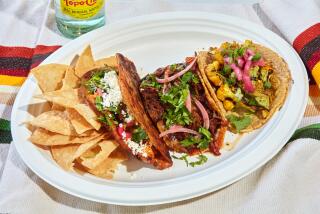The Rules of Taking Food on the Road
- Share via
As the Fourth of July weekend approaches, many of us are planning our picnics and cookouts with family and friends. What you don’t want, after a day of fun, food and fireworks, is for someone to go home with a tummy ache or worse.
Following practical food safety tips can help prevent that from happening. The following are from the U.S. Department of Agriculture’s Food Safety and Consumer Education Office.
* It’s OK to store uncooked hamburger patties, steaks, ribs, chops and poultry in the refrigerator up to two days until ready to pack in a cooler to take to the picnic.
* Marinate meat and poultry in the refrigerator, not on the counter. If you plan to use some of the marinade as a sauce, reserve what you need before putting the raw meat in the remainder to marinate. Don’t reuse marinade unless it’s boiled first to destroy any bacteria that may have been on the raw meat.
* If cooking foods ahead of time, prepare them far enough in advance to be able to thoroughly chill them in the refrigerator. Store large amounts of food in several small containers or packages for faster chilling and easier use. Keep cooked foods refrigerated until time to leave home.
* If you buy takeout food such as fried chicken for the picnic, eat it within two hours of pickup. Otherwise, buy it far enough ahead of time to chill in the refrigerator, then pack it in the cooler.
* Try to take only the amount of perishable foods you plan to eat at the picnic. That way you won’t have to worry at the picnic about the storage and safety of leftovers.
* Pack your food in an insulated cooler with enough ice or gel packs to keep the food at 40 degrees. Pack food right from the refrigerator or freezer into the cooler. Bacteria multiply rapidly in the danger zone between 40 degrees and 140 degrees, so food transported without an ice source or left out in the sun at the picnic won’t stay safe for long.
* Pack plenty of clean, soapy sponges, cloths and wet towelettes for cleaning surfaces and hands and plenty of utensils and platters for separate handling of raw and cooked foods.
* Don’t put the cooler in the trunk; transport it inside an air-conditioned vehicle. At the picnic, keep the cooler in the shade. Replenish ice as it melts.
* Except when it’s being served, keep the food in the cooler. If you pack food in several small containers, you can serve a dish one container at a time, keeping the remainder cold for stragglers and second helpings.
* Avoid opening the cooler more than you have to. The more often you open it, the more cool air escapes. Keep cold drinks in a separate cooler to avoid constantly opening the one holding perishable foods.
* Remove only the amount of meat that will fit on the grill at one time. Keep the rest in the cooler until it’s ready to go on the grill.
* Never partially grill meat or poultry to finish cooking later. Cook food completely to destroy harmful bacteria. Cook hamburgers to 160 degrees on a meat thermometer; large cuts of beef such as roasts to 145 degrees for medium rare and 160 degrees for medium; all cuts of pork to 160 degrees; ground poultry to 165 degrees; whole poultry and parts, except breasts, to 180 degrees; chicken breasts to 170 degrees. Reheat precooked meats such as hot dogs to 165 degrees or steaming hot.
* Never put cooked food on a platter that contained raw meat or poultry.
* Keep cold foods cold and hot foods hot. Food should not be left out more than two hours. If it’s hotter than 90 degrees out, don’t leave food sitting out more than 1 hour. Keep grilled meats hot by setting them to the side of the grill rack.
* Leftovers that have been kept cold should be safe to take home. But once ice or gel packs have melted, perishables are not safe and should be discarded. Put the cooler with leftovers back in the air-conditioned car for the trip home and make sure the food is still “refrigerator cool” to the touch when you get home.
And, now, for the answer to the picnic safety question of all time: Is it unsafe to take foods made with mayonnaise, such as potato salad, to a picnic?
The answer, not if it’s made with store-bought mayonnaise.
The eggs used in the production of commercial mayonnaise are pasteurized to kill bacteria, unlike homemade mayonnaise, which is made with raw eggs and is potentially unsafe under any conditions. The mayonnaise you buy in the store also contains enough acidic ingredients such as vinegar or lemon juice to slow or prevent the subsequent growth of any bacteria.
However, just to be prudent, it’s a good idea when you remove potato salad or any other mayonnaise-based salad from the cooler for serving to place its serving bowl in a larger bowl filled with ice.
For additional food safety information, call the USDA Meat and Poultry Hotline, (800) 535-4555 or visit the Web site at https://www.usda.gov/fsis
More to Read
Eat your way across L.A.
Get our weekly Tasting Notes newsletter for reviews, news and more.
You may occasionally receive promotional content from the Los Angeles Times.










